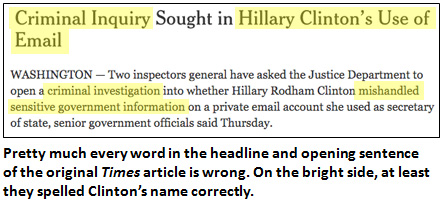As you probably know, the New York Times screwed up epically last week by publishing a story claiming that Hillary Clinton was the target of a criminal probe over the mishandling of classified information in her private email system. In the end, virtually everything about the story turned out to be wrong. Clinton was not a  target. The referral was not criminal. The emails in question had not been classified at the time Clinton saw them. When the dust settled, it appeared that the whole thing was little more than a squabble between State and CIA over whether certain emails that State is releasing to the public should or shouldn’t be classified. In other words, just your garden-variety bureaucratic dispute. Hardly worth a blurb on A17, let alone a screaming headline on the front page.
target. The referral was not criminal. The emails in question had not been classified at the time Clinton saw them. When the dust settled, it appeared that the whole thing was little more than a squabble between State and CIA over whether certain emails that State is releasing to the public should or shouldn’t be classified. In other words, just your garden-variety bureaucratic dispute. Hardly worth a blurb on A17, let alone a screaming headline on the front page.
The Clinton campaign has now officially asked the Times to account for how it could have bollixed this story so badly. Here are the most interesting paragraphs:
Times’ editors have attempted to explain these errors by claiming the fault for the misreporting resided with a Justice Department official whom other news outlets cited as confirming the Times’ report after the fact. This suggestion does not add up. It is our understanding that this Justice Department official was not the original source of the Times’ tip. Moreover, notwithstanding the official’s inaccurate characterization of the referral as criminal in nature, this official does not appear to have told the Times that Mrs. Clinton was the target of that referral, as the paper falsely reported in its original story.
This raises the question of what other sources the Times may have relied on for its initial report. It clearly was not either of the referring officials — that is, the Inspectors General of either the State Department or intelligence agencies — since the Times’ sources apparently lacked firsthand knowledge of the referral documents. It also seems unlikely the source could have been anyone affiliated with those offices, as it defies logic that anyone so closely involved could have so severely garbled the description of the referral.
Yes indeedy. Who was the person who first tipped off the Times reporters? And does that source still deserve anonymity? Clinton’s letter seems to be pretty clearly implying that it might have been Trey Gowdy or someone on his staff, who are currently running the Benghazi investigation that’s recently morphed into a Hillary Clinton witch hunt. Apparently they knew about this DOJ referral a day before the Times story ran, so maybe they’re the ones who passed along the garbled version.
The Clinton campaign can’t say that, of course, since they have no proof. Neither do I. But it sure seems to be the plain implication of their response. Pretty clearly, someone who didn’t have direct access to the referral—but knew of its existence—was the original source, and it’s a pretty good guess that this source was someone unfriendly to Clinton. In other words, someone whose word shouldn’t have been accepted without the most stringent due diligence.
But when you get oppo research, it’s a pretty good bet that others are getting it too. So you have to publish quickly if you want to be first. But that’s not all: you also have to be pretty willing to accept dirt on Hillary Clinton at face value and you have to care more about being first than being right. The authors of the story, Michael Schmidt and Matt Apuzzo, really ought to address these issues in public at a press conference. After all, the press loves press conferences, right?













